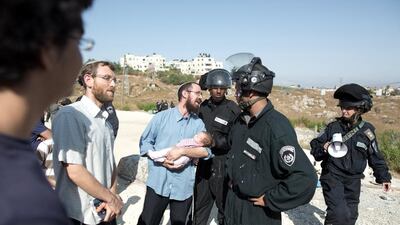Hours after news emerged that Israeli settlers had firebombed a Palestinian home in the West Bank village of Duma, killing an infant named Ali Dawabsha and his father, a Twitter account imitating Israeli prime minister Benjamin Netanyahu tweeted the following: “My message to the vigilantes who killed Ali Dawabsha is clear: if you want to murder Palestinian babies, put on a uniform.”
Acerbic in tone, the tweet captured the sad reality of Israel’s occupation. The actions of the Israeli military – not a handful of renegade settler groups – remain the main driver of violence against Palestinians.
Since the firebombing, Tel Aviv has gone to great lengths to demonstrate a gulf between the actions of violent Israeli settlers living on the West Bank and the attitudes of the mainstream Israeli public. The country has placed a few settlers – none of whom have any direct connection to the arson attack – under administrative detention, or detention without trial, in an effort to show that these “bad apples” will be dealt with in the harshest of terms. To date, settlers have received light sentences by Israeli courts when it comes to violence against Palestinians.
______________________________________________________________
Read more about Israel's occupation:
■ Susiya's struggle lays bare Israel's colonial agenda for Palestine
■ Tel Aviv's panic shows boycotts are having effect
______________________________________________________________
At the same time, the Israeli press has been filled with reports that West Bank settlers will soon set their sights on the state itself. Few, however, are asking how a settler government would be fundamentally different from the current one. The truth is, there would be hardly any difference.
Last week, the Arab Peace Initiative Committee made a recommendation in Cairo to have Israeli settler groups classified as terrorist groups and for their members to be brought to international courts. If such a move were adopted by the international community, which is unlikely, Israel would be a state sponsor of terror thanks to the nature of its occupation of the West Bank, the massive government subsidies given to the settlers and the protection the military offers them. After all, the Israeli occupation remains the largest state project in the history of the country. The daily operation of the occupation, from the management of checkpoints to the creation of new settlements, is overseen by the Israeli state, with its military carrying out all necessary functions. Settlers also participate in the control process by separating Palestinian communities through land seizure and their constant presence.
When it comes to settler violence, settlers operate as small gangs backed up and defended by one of the most advanced militaries on Earth. Settlements on the West Bank and the violence that flows from them are predicated on the Israeli military. Without the full weight of the army, settlers in the heart of Hebron or on the outskirts of Nablus would have no recourse but to leave the West Bank. As such, the settlers are one particularly violent and nasty arm of a much larger and more violent Israeli occupation.
Yet the settlers have been cast by the Israeli mainstream as independent actors with the ability to bring down the state if their demands are not met. This is deliberately misleading so as to establish a false distinction between illegitimate (settler) and legitimate (military) violence.
Last week marked the 10th anniversary of the Gaza disengagement, when Israel removed the 8,000 settlers living in the Gaza Strip. What happened during that stiflingly hot month of August demonstrates the real and perceived power of the settler movement.
After prime minister Ariel Sharon made the decision to remove 21 Israeli settlements in the Gaza Strip, the Israeli government started an aggressive international campaign highlighting the “painful price” Israel was paying by removing the settler infrastructure. Israel didn’t end its control of the Gaza Strip and even bolstered settlement activity in the West Bank in the months following the “disengagement”, but that didn’t stop the country from marketing the event as an honest step towards peace.
The momentum driving this public relations blitz stemmed from portraying the Gaza settlers as violent. For weeks, Israeli society was consumed with the prospect of civil war and various scenarios in which settlers violently resisted eviction. Israeli soldiers were prepared to face violence, but in the end not a single soldier was seriously wounded. Some settlers resisted eviction by throwing paint on soldiers but eventually the settlers dutifully followed orders.
Ten years later, the settler movement has never been in a more secure position. New settlements continue to crop up throughout the West Bank in the face of international condemnation. Settler representatives have reached the highest levels of government.
While mainstream Israelis don’t appear to share the settlers’ worldview, they continue to send their children to the West Bank in uniforms to defend settlements, operate checkpoints and arrest Palestinians as agents of a military occupation. There is little to no willingness inside Israeli society to change this horrific situation. It is no wonder that the past five years have seen a spike in settler violence against Palestinians. The settlers have nothing to lose.
The rise in the settler movement’s prominence is thanks to mainstream Israeli society’s continued distrust of the Palestinians and unwillingness to change the colonial complexion of their country. While many Israelis don’t like to be confronted with the aggressive violence of settlers – the colonial class never wants to be confronted with its own brutality – they tend to harbour similarly racist views of Palestinians all the same. Settler violence is not an anomaly, it is a distilled form of the violence Israel’s occupation in Palestine is built upon. Settler violence, therefore, begins and ends with mainstream Israelis, not the settlers themselves.
jdana@thenational.ae
On Twitter: @ibnezra

